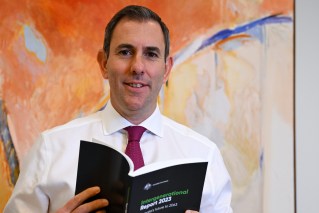Rise of the machines – as technology takes over, it’s our human skills that set us apart
The growth of technology and digital learning should not be seen as a threat to the role of humans – it actually magnifies the value of our skills, writes Shane Rodgers.


Sometimes it feels like digital technology snuck up on us quietly. One day we looked around and realised it was now in every available space in our lives, like a creeping vine on a deserted house.
It seems hard to believe that I uploaded my first digital content 24 years ago. If you look at the emergence of digital in that context, the transformation to a digital world seems remarkable slow.
This slow-burn digital creep may have masked the fact that bit by bit the role of humans in the workplace has fundamentally changed. The rise of ever more intelligent digital machines has forced us to find new functions to justify our presence in offices and factories.
A report released this month by The Australian Industry Group’s Centre for Education and Training (CET) paints a stark picture of the evolution of our workplaces to “socio-digital environments”. Slowly, human workers have evolved from functional roles (checking, lifting, calculating keeping records) to transformers who problem solve, navigate complex issues, and communicate.
The CET report, titled “Skilling Australia to lock in our digital future”, drew on extensive international research as well as direct input from 18 companies navigating the changes.
“As machines do more and more, a human’s value to an enterprise is increasingly about the ability to spot opportunities, formulate strategies and build networks and collaborations,” the report says. “We need to acknowledge the increasing role these capabilities play in workers’ careers and educate and train with this mindset.”
This intersection between the changing nature of human work and our education system is where some of the biggest challenges, and opportunities sit. As the CET’s Executive Director Meg Lilly points out, the secret to unlocking the digital potential in our economy lies primarily with people, not machines.
In this world the traditional notion of studying a largely theoretical course for 3-5 years and then applying it in the workplace is decaying rapidly. The digital world has fast-tracked what might previously have been generational change and forced a skills transformation, and the birth of whole new skills, to be required at a much higher velocity.
In particular, the role of managers has fundamentally changed over the past 20 years as a tsunami of data floods contemporary corporations. Leaders must find ways to interpret and act on this data as they distribute the wave into buckets.
This already heightened velocity of digital transformation went on steroids over the COVID-fuelled change zone of the past two years, with figures showing the “digital intensity” of our workplaces doubled in a single year between 2020 and 2021.
It is well-known that high-level data and cyber security skills are in high demand but, interestingly, the highest skill demand from employers is for “basic” digital skills.
This reflects what employers have been seeing for some time. We do not just need people who are digital specialists. We effectively need whole workforces with a high level of “digital literacy”. This means they understand what digital technology can do for a business and they can apply it confidently, creatively, and critically to meet challenges.
The CET report points us to an urgent need to ensure basic digital literacy for all, remake our education and training systems based on lifelong learning and, crucially, make work-integrated and work-based learning the norm.
We should not underestimate the complexity of this challenge or the absolute imperative to act on it. Between 2018 and 2021 Australia slipped from 13th in the World Digital Competitiveness Ranking to 20. The global economy will not wait for us to catch up.
We rate very highly on attracting overseas talent in this area. However, a first-world country with such huge investments in education and training should be producing enough home-grown talent in this area to meet growing and obvious demand.
In a previous role I had management responsibility for the Digital Brisbane program, established to help Brisbane businesses become more digitally literate. The audiences at our various events were typically older, established businesspeople who knew little about digital technology, and young gun digital gurus who knew little about business.
In the new economy we need to converge old-world business skill and nous with new-world technology that allows many business functions to happen at the speed of thought.
The rise of the machines has been happening for a long time. We need to ensure our human capacity ascends at the same pace, or even faster.
Shane Rodgers is the Brisbane-based national Chief Operating Officer of The Australian Industry Group, a peak employer organisation representing tends of thousands of members. He has a particular interest in social change and the secret languages of the workplace











